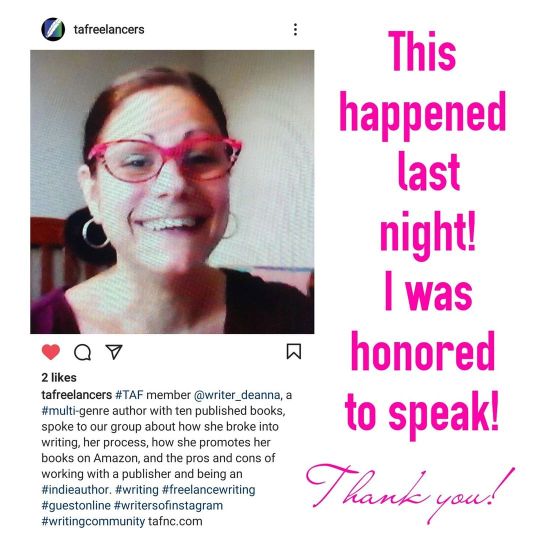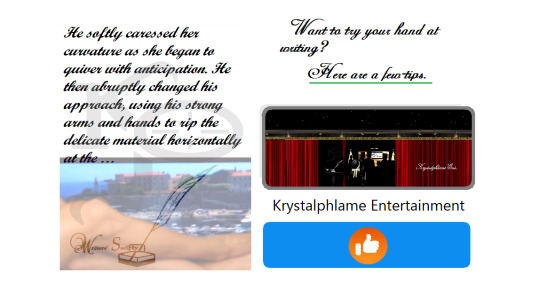#howtowriteabook
Explore tagged Tumblr posts
Text
Many writers on a budget opt for a manuscript evaluation over developmental editing. This allows them to get professional oversight for their work, but leaves them to make concrete changes on their own. If you've ever found yourself wondering things like how to fill in multiple plot holes, or whether the order of your chapters is best for absorbing the educational information you're trying to impart upon your reader, a manuscript evaluation can be a faster, lower-cost way to get answers to those questions along with remedies to those issues.
#GetBookHelp
#WritingTips
#HowToWriteABook
#BookEditor
0 notes
Text
https://www.instagram.com/reel/CyBz9lqg5xJ/?igshid=MTc4MmM1YmI2Ng==
Let’s celebrate the small victories everyday. Here’s mine, I finally figured out my newsletter on my website. If you want to check it out go to www.RMMcDermott.com on the connect page.
#thesmallvictories
#writersoftiktok
#authortok
#howtowrite
#Howtowriteastory
#howtowriteabook
#writingtips
#Writingadvice
#writingprocess
#writertiktok
#newwriters
#thesmallvictories#writersofinstagram#authorsofinstagram#howtowrite#howtowriteastory#writing community#new writers society#newwritersclub
1 note
·
View note
Text
New Pinterest profile!
I wanted to make sure to let my followers know that I created a Pinterest profile! I'll not only be posting pins but making mood boards and boards with resources for everyone! Go and follow it now if you'd like to see what I post.
#writeabook#author#writer#writingcommunity#writersofinstagram#writing#book#authorsofinstagram#writingtips#writerscommunity#writingcoach#bookcoach#bookwriting#bookpublishing#ghostwriter#books#authorsofig#writinghelp#writingabook#howtowriteabook#authorlife#writingadvice#writers#amwriting#writerslife#writingmotivation#publishing#bookstagram#writinglife#aspiringauthor
13 notes
·
View notes
Photo

Last night I spoke to the Triangle Area Freelancers! I was truly honored to be asked to speak as an author 📚 @tafreelancers Thank you for having me! #authordeannamartinezbey #writer_deanna #writerdeanna #authors #writers #bloggers #freelancewriter #publishedbook #indieauthor #socialmedia #writingprocess #bookoutline #newbook #howtowritebooks #howtowriteabook #bookwritingtips #authorspeaks #authorshelpingauthors #authorcommunity #writerscommunity #momlife #momboss https://www.instagram.com/p/CPX5cVKLxze/?utm_medium=tumblr
#authordeannamartinezbey#writer_deanna#writerdeanna#authors#writers#bloggers#freelancewriter#publishedbook#indieauthor#socialmedia#writingprocess#bookoutline#newbook#howtowritebooks#howtowriteabook#bookwritingtips#authorspeaks#authorshelpingauthors#authorcommunity#writerscommunity#momlife#momboss
1 note
·
View note
Text
The Compost of Imagination
1 note
·
View note
Text
Start Writing Strategically
It is no secret that writing regularly is the key to becoming a great writer. We have been told over and over again that we need to write x-amount of words a day or free-write for y-amount of time. These are certainly useful tactics but can be hard to keep up. Maybe you’ve tried these before and stopped after not making the progress you wanted. That doesn’t mean you are a bad writer or lazy. It just means that you’re in need of some strategy and structure.
If you’d rather watch a video than read a blog, check out our video on the same topic here.
Part of establishing this new writing habit involves some psychological trickery. We are intelligent human beings, but we are also animals. There is the logical part of our brain that says things like “I should go to bed before midnight” and “I should eat fewer french fries.” But there is also the primitive part that only cares about food, water, and reproduction.
We need to be very aware of this part of ourselves. We constantly have a voice inside our heads that is looking for immediate gratification, and sadly writing doesn’t always provide that. Our goal is to combat that part of ourselves in a way that establishes a permanent and beneficial new routine.
This means we will need to address how we form new habits. Humans are incredibly habitual. Our brains reward us for doing things on a regular basis, which can work to our benefit and to our detriment. If you decide you want to start writing and just do it whenever inspiration strikes, you are setting yourself up for failure. Find time to regularly write. I know that’s easier said than done, but there are ways to help you establish a new routine.
Finding Time
Often when we start something new, we just find a time in our schedule and throw it wherever it fits best, but we don’t pay attention to an important question: What were we doing with that time before? Podcaster and Youtuber CGP Grey has a great theory on this. He says that to effectively establish a new habit, we need to be time neutral. When we add new things to our schedule, we need to take equivalent things out. Otherwise, we will tend to revert to whatever filled that space before.

Maybe you have a lot of free time and think this won’t be an issue for you, but we still fill our free time in habitual ways. No matter what our schedule looks like, something will likely have to go. We need to be careful about what we choose, though. Some habits are stronger than others, and it may be easier and more effective to remove one rather than another. We must remain aware of the primitive beast that lurks within.
Here’s a personal example: When I was in college, I wanted to start working out. I tried to start multiple times, to no avail. I would go whenever it worked for my schedule and never established a consistent workout routine. After a couple years of false starts, I came across CGP Grey’s theory. I looked at my schedule and saw how full it was. Classes, internships, homework, and media production filled almost every moment of every day.
I realized that if I wanted to get serious about working out, something had to go. I was working morning radio at my university’s student station, and I decided my time was up there. I quit the station and decided that early mornings were for the gym. I was able to make a time neutral change to my schedule, and I was actually able to keep with it!
Address Roadblocks
It will no doubt take some experimenting to establish a new schedule. We all have different inclinations and habits, and we may need to play around and see what works. It is important to record what does and doesn’t work. If we stay aware of the things that keep us from writing, then we can plan for them and adjust accordingly.

Identify the things that we think will help us maintain the habit and the things that hold us back. As we start to see these tendencies play out over and over again then we can really start to address them.
To continue my example from earlier: I actually didn’t just start working out regularly right out of the gate. I fell into the trap that many people fall into when it comes to exercise. Day one, I hit it hard then woke up the next day super sore and didn’t go back. This caused a few more false starts and the ever-familiar “I’ll try again next week.” I would get upset at myself for not working through the soreness which would lead to self-doubt about the whole situation.
Eventually, I came up with a new plan: start small. I decided not to work out so much that I got sore, because I knew I wouldn’t go to the gym the next day if I did. That was when I actually started hitting the gym on a regular basis, and I was able to slowly build up to where I wanted to be. I identified the things that kept me from what I wanted to do and addressed them.
In terms of writing, I know that my phone has often been an issue. It is a grand distraction. Every little notification has the ability to completely derail me. Step 1 for me was putting it on do not disturb mode, and while that helped, it didn’t completely resolve my issues. I would still instinctually pick up my phone and start scrolling through some app designed to steal my attention. So I downloaded an app designed to block distracting apps during my writing time.
That helped a lot. Sometimes I still find myself still disabling that app and scrolling anyway, but at this point, if I am having a particularly hard time with my phone, I just put it in the other room. Even small things like that can help us stay consistent and effective.
An important thing to address here is the feeling of self-doubt caused by failure to stick to our new habit. It is inevitable, and we all feel it. It is hard to distance our self-worth from our failures, but if we stay aware of what caused us to fail, then we haven’t failed at all. We’ve learned. In the words of Adam Savage, “Failure is always an option.” Establishing a new habit is incredibly difficult, and just because you’ve been unsuccessful in the past doesn’t mean you always will be. Take those failed attempts, see what caused them, and then address it.
Goals
Our brains love to hit goals. When we hit a goal we’ve set, our brain will reward us for it in the form of chemicals. As we associate these chemical hits with a certain task, we will be more likely to do a task again. When we eat food with a lot of sugar, our brains reward us with dopamine, so we tend to really like sugar!

If you start setting and reaching writing goals, you can trick your brain to reward you for writing. This helps change your habit from something that your logical brain wants into something that the primitive brain also craves. Turn writing into sugar!
As with anything else, we need to be strategic. People like Stephen King will tell you “write 1000 words a day,” but you might be setting yourself up for failure if that’s where you start. Start with something manageable and stick to it. Writing 1000 words a day will no doubt help you become a better writer, but not if you aren’t able to do it consistently. When it comes to setting goals, it’s important to be somewhat conservative.
If you set goals that you aren’t likely to accomplish, you will experience the opposite of the desired effect. Your brain will start to associate the failure of not hitting goals with writing and will be dis-incentivized from doing it. We need to set attainable goals and increase them over time. Then we can work our way to 1000 words a day or whatever your daily goal is.
Starting writing can be incredibly hard. It isn’t as easy as “just doing it.” Once we become conscious of the things that hold us back, we can really start to hone our craft. Having a consistent writing plan will provide a path for you to improve. Obviously, there are other things we can do along the way to help we’ll address in future blog posts, but the first step is starting.
Don’t forget to put your plan in action with our Let’s Find Time worksheet. If you have any questions or comments, join the discussion on our Discord! For more writing advice, check out our YouTube videos on the Campfire Technology YouTube Channel.
#writing#writingadvice#writinghelp#writingtips#writeblr#writingcommunity#campfireblaze#campfirepro#howtowrite#authorsoftumblr#author#writer#writersoftumblr#writers#writblr#writing encouragement#writingworkflow#start writing#howtowriteabook
1 note
·
View note
Photo


Simple Steps On How to Write a Book #howtowriteabook #tipsforwritingabook #contentcreation #plr https://wp.me/pb4Or7-Vs
1 note
·
View note
Photo

Raise the stakes by keeping things personal. If the world isn't ending, what do your characters stand to gain or lose?
5 notes
·
View notes
Photo

This is my website with lots of free downloads (including workshops on creativity and writing), announcements of new books and a blood-chilling glimpse into how the world ends.
https://biffmitchell.com
#AuthorWebsite#Literature#Humor#SpeculativeFiction#ScienceFiction#CyberPunk#BiffMitchell#ShortStories#MagicalRealism#Surrealism#WritingWorkshops#FreeWritingResources#HowToWriteANovel#HowToWriteABook#HowToGetPublished#HowToFindAPublisher#HowToCreateFictionalCharacters#HowToWriteInCoffeeShops#HowToBeCreative#FreeCreativityWorkshop#FreeCreativeWritingWorkshop#AuthorUpdates#FreeStories#Photography#Art#Writing
0 notes
Photo

Read Free eBook Here https://ebook-2.com/ebooks/how-to-create-your-own-e-book How To Create Your Own E Book Stop Struggling Trying To Write Profitable Ebooks Yourself, Especially If You Hate Writing! You Can Now "Create Your Own E-Book Without Ever Writing One Word"... If you want to make lots of money selling ebooks online, but you hate to write.... Or if you just can’t face sitting down at the computer and slogging away to produce ebooks... Then this will be one of the most important messages you’ll ever read.
#howtowriteabook#howtowriteaprofitablebook#howtowriteanebook#issellingebooksonamazonprofitable#howtocreateanebook
0 notes
Photo

Read the caption 👇🏼 . How font choice affects the mind? . Before starting anything, we should understand how humans read. So the answer to these questions is actually we don’t read we scan everything with our eyes. . . You can see an example in the picture of how we scan the words from top to bottom. . When we understand how we read (scan), we can learn how to write anything to anyone. . In the digital marketing world, fonts and sizes are very important, and they can be very effective on your business sales. . Instagram: @simplegrowmarketing . 📌Website: Simplegrowmarketing.com . . Hashtags: #simplegrowmarketing #digitalmarketingworld #digitalmarketingtips2022 #digitalmarketingtips #howtousefonts #digitalfont #socialmediatipsforbusiness #howtowriteabook #howtowrite #fontdesign #learnmarketing #businessfont #businessbuildingtips #businessmarketingtips #businessmarketing (at Seattle, Washington) https://www.instagram.com/p/CjkpSH-N_ok/?igshid=NGJjMDIxMWI=
#simplegrowmarketing#digitalmarketingworld#digitalmarketingtips2022#digitalmarketingtips#howtousefonts#digitalfont#socialmediatipsforbusiness#howtowriteabook#howtowrite#fontdesign#learnmarketing#businessfont#businessbuildingtips#businessmarketingtips#businessmarketing
0 notes
Text

#ig#howtowriteamanuscript#howtowriteabook#howtowriteanovel#writing_tips#writing#writinganovel#editingamanuscript#howtoeditamanuscript#writingabook#book#books#author#writer#reading#read#write#literature#jameskp#JamesKrystalphlame#jameskrystalphlame#Krystalphlame#KP#KrystalphlameEntertainment#KrystalphlameEnt.#krystalphlame#krystalphlameent.#babblingbooks#crazybooklady#antisocialinfluencer
0 notes
Photo

A lovely review for my new how-to book, WRITE THAT BOOK, thank you, much appreciated 🙃 http://viewbook.at/WriteThatBook #bookreview #bookstagram #booklover #writingtips #writingadvice #writing #WritingHacks #writinglife #writinglines #BookBoost #sccunningham #howto #howtowritebooks #howtowrite #how #howtowriteabook #howtowritebooks #writingfiction #writinganovel #howtowriteanovel #writingprocess #writingden #beginner #beginnerwriter #bookrecommendations #writethatbook #writethatnovel https://www.instagram.com/p/CcL5HYdtcSq/?igshid=NGJjMDIxMWI=
#bookreview#bookstagram#booklover#writingtips#writingadvice#writing#writinghacks#writinglife#writinglines#bookboost#sccunningham#howto#howtowritebooks#howtowrite#how#howtowriteabook#writingfiction#writinganovel#howtowriteanovel#writingprocess#writingden#beginner#beginnerwriter#bookrecommendations#writethatbook#writethatnovel
0 notes
Text
Should you write what you know?
#author#books#howtowrite#howtowriteabook#howtowritewell#writer#writing#writingabook#writingtips#writingwell#writingyourfirstbook
1 note
·
View note
Link
Our signature, customized writing course for those interested in learning how to write a book and market childrenu2019s stories and articles. Students learn techniques of good writing, develop the ability to direct writing to specific readers, and undertake projects that match their skills and interests to editorial needs of publishers of material for children.
0 notes
Photo

Where To Find Writing Inspiration #contentcreation #plr #howtogetinspired #howtowriteabook #tipsforwritingabook https://wp.me/pb4Or7-Ww
1 note
·
View note